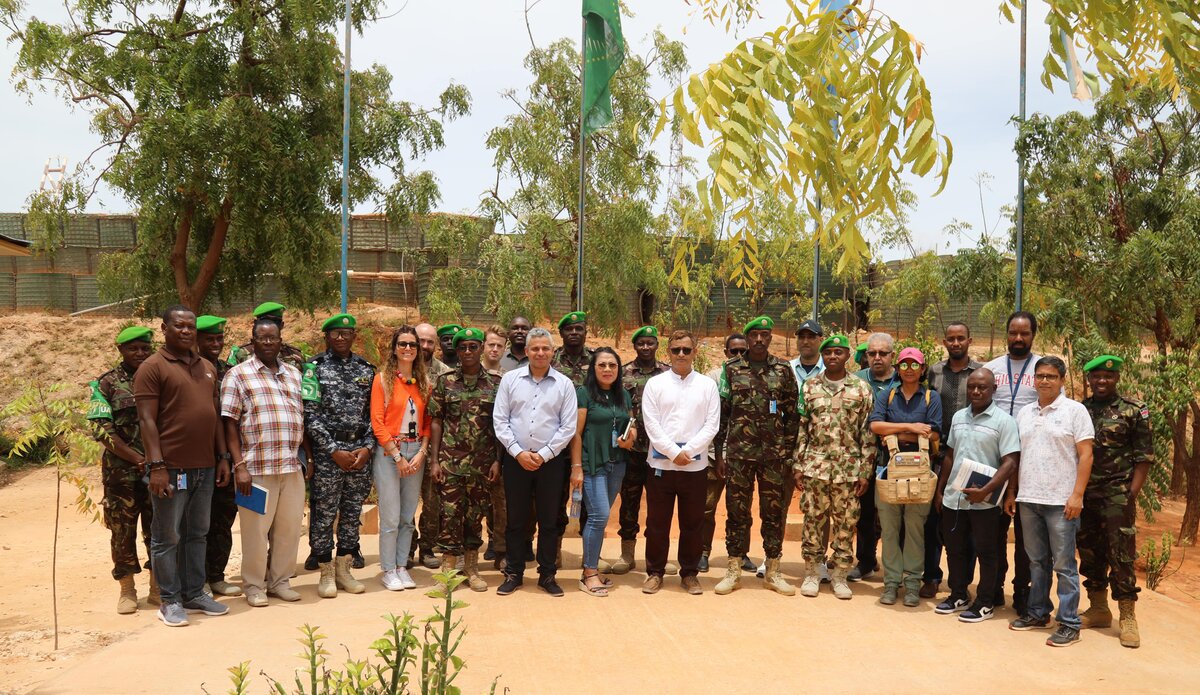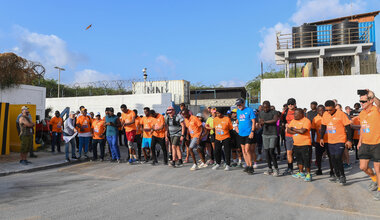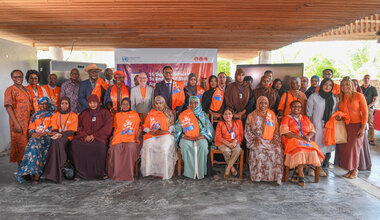UNSOS Supports AUSSOM driving security transition in Sector 2
Kismayo - The United Nations Support Office in Somalia (UNSOS) continues to play a vital role in Somalia’s journey towards peace and stability. Through the delivery of strategic logistical, engineering, and life-support services, UNSOS enables the African Union Stabilisation Mission in Somalia (AUSSOM) to conduct its mandate effectively across the sectors.
A recent field visit to Kismayo by the UNSOS Service Delivery Management Pillar and the Mission Support Centre highlighted the Mission’s frontline contributions to AUSSOM’s operations in Sector 2 – from ensuring a safe and secure environment to supporting the transition of security responsibilities to Somali Security Forces (SSF).

Colonel Meshack Kishoyian, AUSSOM Deputy Sector Commander in Kismayo from the Kenya Defence Forces (KDF), stressed just how critical this support is: “We cannot survive without UNSOS. From the time we deployed, UNSOS has been critical in ensuring that our role in realization of the mandate and mission here in sector 2 and also across Somalia is successful. They offer life support, that is food, water and also fuel. UNSOS has been key, they have been proactive to ensure our success is realized”.
The UNSOS delegation, led by Deputy Pillar Chief, Ali Azam, and accompanied by British Captain Nathan Truscott (Military Advisor), Montasser Bellah Elaydi (Plans Officer), Captain Alex Gale (Executive Officer, Mission Support Centre), and Ekokusendang Westberg (Joint Sector Operations Centre – Desk Officer Sector 2), engaged with AUSSOM leadership, including KDF officers overseeing Sector 2. Their discussions underscored how UNSOS's contributions underpin the mission's daily operational effectiveness. Colonel Kishoyian also highlighted the role of women within AUSSOM, emphasizing the significance and vital presence of female officers in logistics, operations, and administration.

UNSOS Logistics: The Engine Behind Operations
In Kismayo, logistical support goes beyond the operational. From timely delivery of fuel and medical supplies to the seamless provisioning of rations and clean water, UNSOS ensures that AUSSOM’s forward operating bases (FOBs) remain functional and secure.
“UNSOS supports us logistically in terms of rations, water, petroleum, oil and lubricants, and medical stores and logistics are all key elements to successful operations”, explained Captain Lucy Esenyer, deployed in AUSSOM Acting Sector Logistics Officer. “On rations, they ensure this constant and timely supply and distribution of rations to various FOB's. By providing water and medical stores we are able to have a healthy force that are able to achieve the AUSSOM mandate effectively. By constant and timely supply of oil we are able to service our vehicles to carry out our day and night patrol within our area of responsibility”.

As the logistics focal point for KDF FOBs, Captain Esenyer works closely with UNSOS and the Joint Operations Center (JOC). She recalled a recent joint mission to the Ludlow IDP camp, 30 kilometers north of Kismayo, where smooth logistics proved critical: “My work as a logistic officer is to ensure that the troop-carrying vehicles are serviced, they are well maintained, and the fuel is really available to ensure transportation of our troops to IDP camp”.
This collaboration between AUSSOM and UNSOS proves especially vital when unforeseen challenges threaten operational continuity. In 2024, when heavy rains disrupted supply routes from the seaport to the FOBs, UNSOS stepped in, airlifting rations to troops by helicopter. Later, when the water treatment plant in Afmadow broke down, clean drinking water was delivered within just three days. “That was a very good gesture and effort by UNSOS which is a morale booster to our troops that ensure that despite any challenges arising we are able to support them anytime”, said Colonel Kishoyian.
UNSOS and Healthcare Support: Ensuring Medical Readiness
At Kismayo’s Level 1 Plus Hospital, UNSOS’s contribution to medical services is equally vital. Captain Gakenia Kagocha, hospital administrator and nurse, highlighted the impact of their support in the benefit for both AUSSOM and SSF troops, as well as Somali civilians.
“UNSOS is very critical because on provision of drugs. If UNSOS was not in a position to provide us with drugs, I don’t think we would effectively carry out the CIMIC [civil-military cooperation] activities, also bearing in mind a good number of equipment’s are owned by UNSOS and they also repaired and serviced by UNSOS so they ensure very efficient healthcare delivery at our hospital”.

Beyond administration, Captain Kagocha provides direct patient care and helps train SSF units in combating casualty care. “When the Somali security forces go for combat and they get casualties, we have ensured that we support them to prevent the loss of lives, and we have done that successfully for the last 14 months”.
AUSSOM Mandate in Supporting SSF and UNSOS the Heartbeat of the Mission
Whether in the form of ATMIS or AUSSOM, the African Union mission’s core mandate and responsibilities have remained consistent. As Colonel Kishoyian outlined, the four main pillars are: disrupting Al-Shabaab, strengthening the Somali Security Forces, enabling humanitarian assistance, and protecting UN and AU personnel and assets.
“Our mandate is to ensure that there is peace. We work hand in hand with the SSF to ensure that they develop the capacity to take over the security responsibility from the AUSSOM troops”, affirmed Lt. Col. John Maina, Commanding Officer of the Mechanized Infantry Battalion in Sector 2.

In this regard, progress toward Somali security ownership is tangible as Lt. Col. Maina testified: “When I came here, I had four FOBs under my command. I handed over two of them to the Somali Security Forces, and up to date, they have been able to secure them. That shows they have gained the necessary capacity to operate by themselves. And in extent, we believe this is a good direction toward the whole country being able to manage its affairs.”
This strategic handover of FOBs marks a key milestone in Somalia’s national security ownership. The process forms part of a broader transition effort aimed at empowering Somali forces to assume full responsibility for the country’s security.
Among the initiatives fostering this transition, capacity-building sessions in operations also stand out, where collaboration between partners becomes mutually reinforcing. A good example is the explosive hazard awareness courses, conducted jointly by AUSSOM and UNMAS. “We undergo several trainings on road clearance and also battlefield emergency aids that enforces both the AUSSOM troops and the SSF troops to have a common doctrine towards the peace support stabilization here in Kismayo”, explained Captain Henry Cheboi, Sector Engineer Officer.

For Lt. Col. Maina, that the support given by UNSOS is enabling mission success is clear: “Without UNSOS there cannot be AUSSOM, because everything needs logistical support. UNSOS is like the heartbeat of this mission. When you look at all the logistical requirements that we have, without them, we cannot achieve the AUSSOM mandate. Logistics is critical for any nation to achieve its objectives, and AUSSOM is no exception”.
A Shared Legacy of Peace
“Our legacy is to leave this area safe and secure to ensure that other aspects of life continue, and that one can only succeed if UNSOS gives us the support”, concluded Colonel Kishoyian. “Now AUSSOM has very important stages to handover of responsibilities to Somalia. UNSOS should continue working with us until we achieve a safe and secure environment which is a peaceful to ensure the Somali people realize the peace that they really long for and UNSOS has a critical role to play in enabling AUSSOM do that”.

As AUSSOM continues its mission of transition and stabilization, UNSOS stands committed to enabling its partners, the African Union and the Federal Government of Somalia, to build across the sectors a lasting peace and a secure environment for all Somalis.
 UN
UN





